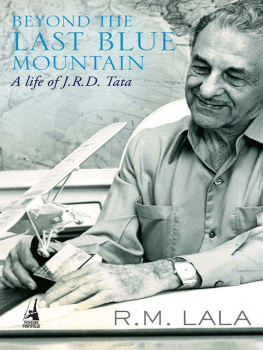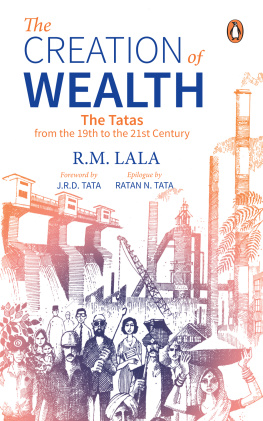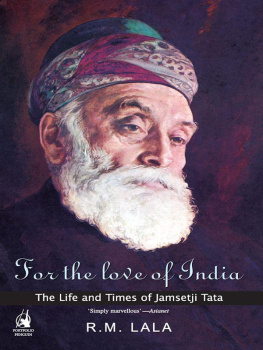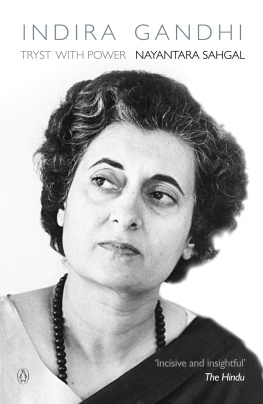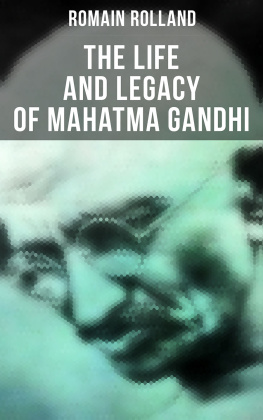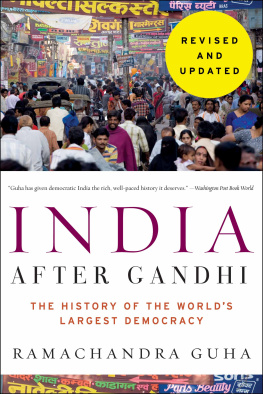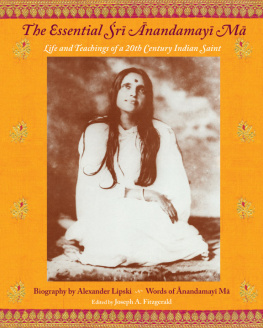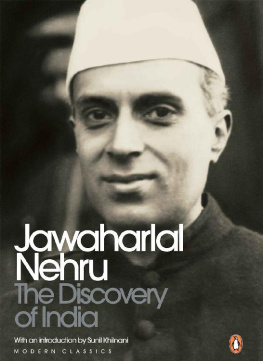The illustrations on the interleaving pages preceding Parts I and II are by the British artist Henry Morshead. Illustration 1 shows the twin heritage of J.R.D. Tata: The stairway at Persepolis representing his fathers heritage from ancient Persia and the Eiffel Tower, the French heritage from his mothers side. Illustration 2 is a sketch of the Boeing 707 and the Puss Moth drawn to scale. Illustration 3 shows the Tata crest as designed by the founder, Jamsetji Tata. The words Humata, Hukhta and Hvarshta in the ancient Avesta language mean Good Thoughts, Good Words, and Good Deeds. J.R.D. Tata later redesigned the wings. Illustration 4 is an artists impression of the young J.R.D. Tata.
Preface to the Revised and Updated Edition
After the release of the first edition of this book in January 1992, two events of note took place. The first was the award of the Bharat Ratna to J.R.D. Tata on Republic Day 1992, and the second was the bestowing of the United Nations Population Award, 1992, on him for his pioneering and sustained efforts for family planning in India. The Bharat Ratna was mentioned in the second edition, but I felt a completely revised preface was necessary for the paperback edition, the first to be printed after his death on 29 November 1993.
His passing away received press coverage worthy of a prime minister. Weeks after his death, articles, letters, advertisements and hoardings continued to appear; the message of his former company, Air India, would have made him rejoice:
He touched the sky and it smiled.
He stretched out his arms
and they encircled the globe.
His vision made giants out of
men and organisations.
A couple of years before he passed away he told me more than once that he wanted to die abroad. All chairmen of Tata Sons have died abroad, he would say. I did question J.R.D., Even if they happened to die abroad, why do you want to do so? If I die abroad, he said gently, I will be no bother to people here.
The well-known journalist, M.V. Kamath, wrote after J.R.D.s death, In his life what J.R.D. did was what any pilgrim might have wished to do: go always a little further beyond the last blue mountain, wishing to know what lay there.
One of J.R.D.s traits was that he questioned every major concept, not because he was averse to it but because his logical mind wanted a clarification. In that process he often clarified the other persons thinking.
During our last conversation shortly before he left for Europe on his last visit he questioned me at length about the concepts we were discussing; that meeting (described at some length in the Epilogue) revealed that J.R.D. wished to know what lay beyond the last blue mountain.
One of the major topics of that dialogue was the hymn, Abide With Me, the last words of which are:
Shine through the gloom, and point me to the skies:
Heavens morning breaks, and earths vain shadows flee;
In life, in death, O Lord, abide with me!
*
When J.R.D. was living I concluded this biography with the words: And as the evening mellows and the shadows lengthen, somewhere above in the sky, in an invisible Puss Moth, is a voyager still pressing ahead to cross beyond the last blue mountain where a glorious sunset awaits him.
I hope I was mistaken and that beyond that last blue mountain heavens radiant morning embraced him.
R.M. Lala
Bombay
16 December 1993
Preface to the First Edition
The year is 1930. A tiny Puss Moth with a single engine is droning over the arid expanse of Iraq at about ninety miles per hour. The pilot is a young man of twenty-six, who is flying without a radio, without landing aids, without instruments except an altimeter and a speedometer. In the distance rise the large mountains and the land beyond the Euphrates and the Tigris. He presses forward in that little plane to reach beyond that last blue mountain.
The year is 1990. The same man at eighty-six is seated comfortably in his well-appointed office with a physical map of the world behind him, also portraying the elevation of the mountains of Iraq he once flew over. This time he is talking of the twenty-first century. You know I would like to live to see the 21st century because by that time you will be able to travel from London to New York within 1% hours. Planes will climb into space, fly at three times the speed of sound without friction before re-entering the atmosphere and landing in New York. Forever young, this man approaching ninety still seems eager to go beyond the distant blue mountain.
J.R.D. Tata was born when the twentieth century opened its eyes. The year was 1904, when the Russo-Japanese war broke out, when work on the Panama Canal began and when Sir Francis Younghusband led the expedition that opened up Tibet to the world. It was a time when Edward VII reigned as the King-Emperor of India, when Mahatma Gandhi was trying his early experiments with truth in South Africa and a rather well-featured young man called Jawaharlal Nehru was being groomed in Allahabad to enter Harrow.
The world was still young. There were many mountains to climb and rivers to cross. Amundsen had yet to reach the South Pole and the peak of Mount Everest had to wait half-a-century before its snow experienced the first footprint of man. The century to unfold was to result in amazing-discoveries and inventions. The aeroplane, radio and television were to make the earth a much smaller planet to live in. It was a century that was to experience two world wars and see the rise and decline of Fascism and Communism. It was a century that would witness the old colonial order shatter into a hundred independent nations. Till the middle of the century, as late as 1950, there were only four independent countries in the whole of Africa: Ethiopia, Egypt, Libya and South Africa. By the late sixties there were forty-nine.

